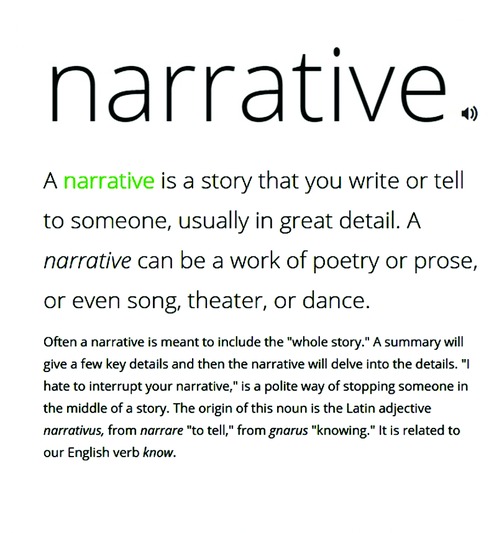Arguably the most overused word in present-day conversation, particularly on English television news channels, is the word narrative. Not an evening passes by without having to listen to at least half-a-dozen luminaries holding forth on a variety of subjects, interspersing their comments with the word narrative at every given opportunity. The word leverage comes a close second. At times, the usage and sentence construction are apposite, and, at other times, not. I have come to the conclusion that we can put it down to some kind of mild infection that is, well, infectious. Or do I mean contagious? Somebody must have first employed the word narrative very consciously in a sentence, and the next thing you know, it spreads like a rash. Personally, it is my belief that most of our news anchors simply like the sound of the word, and the rest of the panel just latch on to it. Like some adhesive limpet.
The online dictionary, Vocabulary.com, defines the word narrative as follows: A narrative is a story that you write or tell to someone, usually in great detail. A narrative can be a work of poetry or prose, or even song, theater, or dance. Often a narrative is meant to include the "whole story".
All right, we get it. Narrative (we can now drop the italics) is just a more fancy word for story. And who can deny that our television panellists don't make a song and dance about it, during these so-called televised debates. And yet, can the one (narrative) be considered a perfectly interchangeable synonym for the other (story)? Try a few of these on for size. Erich Segal's blockbuster novel cum movie, 'Love Narrative'? Fulton Oursler's classic on the life of Jesus Christ, 'The Greatest Narrative Ever Told'? The Broadway musical, 'West Side Narrative'? 'Toy Narrative' - all three of them? And just to show there's no ill feeling, let's throw in a couple of Indian films as well. 'Arekti Premer Golpo' ('Another Love Narrative') and 'Kahani Kismat Ki' ('Luck Narrative'). No, I don't think that quite cuts it. I am sure the reader is astute enough to guess where I am going with this.

I must admit the word, narrative, attracts one of those broad definitions that can cover a 'multitude of sins'. Let us examine more closely how some of our fellow worthies on the idiot box go about mauling this largely inoffensive word.
TV Anchor - 'I am sorry Mr. Patra, we are discussing the issue of whether it is at all technically possible to tamper with these Electronic Voting Machines (EVMs), and not if your party apparatchiks actually did so or not. Kindly do not change the narrative'.
Mr. Patra - 'Please do not try to impress the viewer by using words like apparatchiks. Etymologically speaking, the word has Russian origins, which our party is not overly attracted to. We all know you went to Oxford. And incidentally, I am not trying to change the narrative with regard to the alleged fiddling with the EVMs. The tone of voice used by the honourable member of the opposition party, for whom I have the highest regard, clearly suggested that our party was involved in some sort of finagling at the booths.'
TV Anchor - 'Wow. Finagling, that's a new one on me. Must look it up.'
Mr. Patra - 'No need to look it up, my dear friend. In simple language, it means cheating. Oxford is not the only place where English is taught. I have come across many English people who freely admit that many Indians speak better English than the Brits. This is the new narrative of new India.'
TV Anchor - 'Touche, Mr. Patra.'
Mr. Patra - 'Too what?'
TV Anchor -'Never mind.'
I switched channels, only to discover one of India's well-respected psephologists holding forth on the ills of exit polls. He was being particularly critical of research agencies, which depend on insufficient sample sizes to arrive at sweeping predictions.
Psephologist - 'This is ridiculous. On a population base of 125 crore, the agencies interview less than 50,000 respondents, and proceed to confidently extrapolate, project and predict the results of the elections based on their findings. So much for poll pundits. It is corrupting the election narrative to absurd levels.'
TV Anchor - 'When you say 'election narrative', do you mean it is all a fabricated story?'
Psephologist - 'I didn't say that. You did. And it could very well be. An inspired narrative, I mean.'
TV Anchor - 'I don't know about you, Sir, but I think we are all guilty of overusing this word, narrative. I think we should look for a substitute word that means the same thing.'
Psephologist - 'I agree. Narrative means story. Let's stay with story then. Simpler and less pretentious. I think our election results have all been one big, fantastic story. And the media have leveraged it to the hilt. What do you say?'
TV Anchor - 'Yes that sounds just about right. Though the inflection on the word, story, definitely changes the narrative. Sorry, just a slip of the tongue. Next week, we'll analyse the egregious use of the word, leverage. Good night.'










